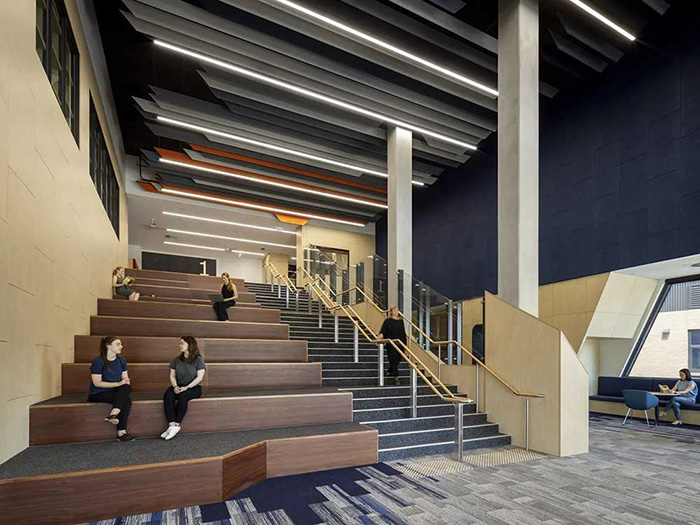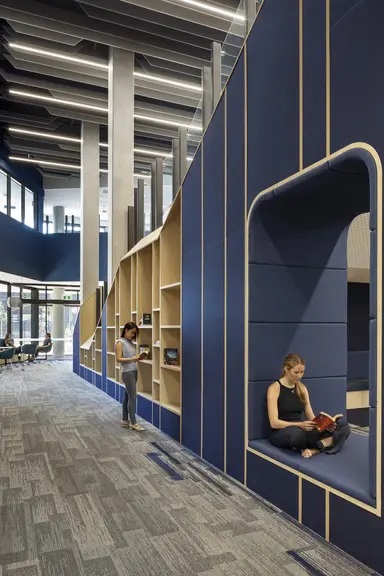Several products from Autex Acoustics were used to create a more productive learning environment as well as achieve interior design goals at Port Melbourne Secondary College.
As a ‘vertical school’, Port Melbourne Secondary College is part of a growing trend for inner-urban residential areas where land is both scarce and expensive. This evolving building type typically encompasses all facilities within one or two buildings, pivoting around a central hub or atrium and with outdoor connections created at plaza level and via outdoor terraces.
Acoustic control in challenging environments
Architects Billard Leece Partnership (BLP) have designed a state-of-the-art teaching and learning campus for 1100 students in the Fishermans Bend community. Its vertical format presents unique design challenges. With secondary students being more mobile and with higher voice levels than in a typical workplace, managing acoustics was key to creating a healthy and inclusive learning environment.
“We know from previous school design that the common spaces need to perform acoustically too,” says Ariel Lopez, principal and education design lead at BLP. “While classrooms are required by state guidelines to have a minimum acoustic performance, connecting spaces are not. Yet these common areas are critical for the social, collaborative learning that happens before and after formal lessons. Right from the start, we tackled creating quiet space throughout these open-plan areas, all the time managing the budget, which is key for a state school.”
BLP specified a range of Autex Acoustics products, including Quietspace Panel, Cube, Frontier and Acoustic Soffit Liner (ASL) for classrooms and common spaces.
Acoustic treatment for open-plan and vertical spaces
The school comprises two connected buildings whose design makes reference to the ships and container yards of Port Melbourne. “It’s a 10,000sqm school on a 7,000sqm site, and the container reference helped us break up the big floor plate and connect all levels,” says Lopez.
Within the building, the social stair, considered the building’s heart, is an active informal learning environment that promotes interaction and visual linkages between levels. Other learning areas include a fabrication lab and robotics workshop with both discrete and common spaces.
“It can be difficult to create a good acoustic environment in the open-plan and common spaces,” says Lopez. “They are often double height and have to facilitate movement from one area of the school to another. Many have exposed services with no ceilings, so here we made extensive use of the Autex Frontier acoustic baffle system to absorb reverberant sound.”

Frontier’s fins can be mounted flush, fixed to rails or suspended individually, allowing the architects’ endless configurations to fit the unique geometries of each space. The dynamic form of the building plan and section was matched by the direction and form of the acoustic baffles.
A total package for acoustics and aesthetics
The commitment to acoustics was one of the project’s biggest innovations, and it brought together two major considerations: acoustic performance and design aesthetics.
In flexible learning areas, both teachers and students can be affected by poor acoustics, and interconnected spaces will have both a greater volume and a smaller total surface area that can be used to acoustically treat the space. In practice, this means that all available surface area should have acoustic treatment applied.

The Autex Cube acoustic panel allowed designers to treat interior walls effectively without compromising visual appeal. “Embedding acoustic materials doesn’t always provide a good design outcome,” says Lopez. “Using Cube on internal walls helped us inject colour. Each building features a colour that represents coming from the sea, going up to the land and then to the school, and the Cube panels supported that.”
Innovative materials double as sound absorption and transmittance
Good acoustic performance depends on reducing noise between spaces and improving the quality of sound within the space. At Port Melbourne Secondary College, treating ceilings with a combination of Quietspace panels and ASL thermal and acoustic soffit and slab liner addressed both problems.
Beyond the requirements of excellent acoustic performance, incorporating Autex materials into the design of the school offered BLP creative freedom when it came to form, function and aesthetics.
“There’s more than a single way to use these materials,” says Lopez. “They’re highly versatile, and the different thicknesses and colours can inspire novel ideas – such as using the vertical Frontier fins to support environmental graphics.”
Most importantly, Port Melbourne Secondary College helped them create an innovative environment that encourages learning by offering spaces that look, feel and sound good.
Project details
Project: Port Melbourne Secondary College
Architect: Billard Leece Partnership
Builder: Hutchinson Builders
Installer: Bach Commercial
Featured products:
- Cube Acoustic Panel
- Quietspace Panel
- ASL
- Frontier
Photographer: Dianna Snape

